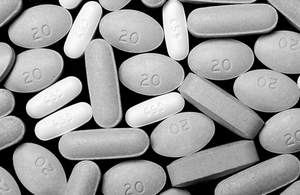ACMD tells ministers drug-related deaths will continue to rise if treatment programmes are not maintained
A report published today (Monday, 12 December) by the Advisory Council on the Misuse of Drugs investigates the causes of the increase and potential responses.

Drugs
Maintaining the capacity and quality of drug treatment is essential to prevent further increases in opioid-related deaths, government drug advisers have told the Home Secretary today (Monday, 12 December).
Over the last 4 years, the number of reported drug misuse deaths involving opioids (including heroin) rose by 58% in England, 23% in Wales and 21% in Scotland.
A report published today by the Advisory Council on the Misuse of Drugs (ACMD) investigates the causes of the increase and potential responses.
The ACMD’s Drug-Related Deaths (DRDs) Working Group found that there is a sizeable number of people who have used heroin since the 1980s and 1990s with complex health problems. These people are increasingly vulnerable to opioid-related deaths as they age.
The report, ‘Reducing opioid-related deaths in the UK’, says:
We can assert with a good degree of confidence that the increasing vulnerability of the UK’s ageing cohort of heroin or opioid users with increasingly complex health needs (including long-term conditions and poly-substance use), social care needs, and continuing multiple risk behaviours is highly likely to have contributed to recent increases in drug-related deaths.
The panel of experts also outlines other potentially important issues:
Other factors, including changes in the availability of street heroin, socio-economic changes (including cuts to health and social care, welfare benefits and local authority services) and changes in treatment services and commissioning practices may also have contributed to these increases.
In response to the increase in opioid-related deaths, the report makes the following recommendations:
- improve the current data processes by creating data standards for local reporting that feed into national systems
- central and local government implement strategies to protect current levels of investment in evidence-based drug treatment to promote recovery
- central and local governments continue to invest in high quality, tailored opioid substitute therapy (OST) of optimal dosage and duration
- naloxone, medication used to reverse the effects of opioid overdose, is made available routinely, cheaply and easily to people who use opioids and to their families and friends
- governments consider the potential to reduce drug-related deaths and other harms through the provision of medically supervised drug consumption clinics in localities with a high concentration of injecting drug use
- governments encouraged to carry out more research on drug-related deaths and treatment services
- an integrated approach for drug users at risk of drug-related death that includes access to physical and mental health and social care services
The expert panel raised concerns that ‘drug treatment and prevention services in England are planned to be among those public health services that receive the most substantial funding cuts as a consequence of the government’s decision to cut the public health grant’.
Annette Dale-Perera, co-chair of the ACMD’s Drug-Related Deaths Working Group, said:
We can assert with a good degree of confidence that the ageing profile of heroin users with increasingly complex health needs, social care needs and continuing multiple risk behaviours has contributed to recent increases in drug-related deaths.
The greater availability of heroin at street level, the deepening of socio-economic deprivation since the financial crisis of 2008, changes to drug treatment and commissioning practices, and the lack of access to mainstream mental and physical health services for this ageing cohort have also potentially had an impact.
Alex Stevens, co-chair of the ACMD’s Drug-Related Deaths Working Group, said:
We welcome the government’s commitment to reducing preventable heroin-related deaths but they must ensure the current standard and availability of drug treatment is at least maintained.
Without continued government intervention, it is likely that opioid-related deaths will continue to rise.
There are evidence-based steps that the government could take to limit and potentially reverse this increase. Most importantly, national governments in the UK could at least maintain investment in opioid substitution therapy of optimal dosage and duration.
Governments’ previous investments in effective drug treatment have limited increases in opioid-related deaths in the past. They now have the opportunity to act to save more lives.